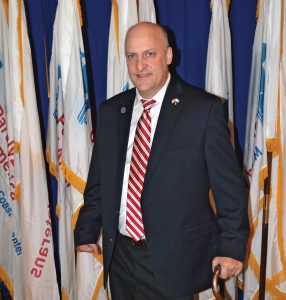We seek to ensure that if care is provided in the community that it is appropriate and meets the needs of the veterans seeking it
By David Zurfluh/National President
Historically in March during Paralyzed Veterans of America’s (PVA) Advocacy and Legislation Training Seminar in Washington, D.C., the PVA national president is afforded the opportunity to give the organization’s oral testimony before a joint session of the House and Senate Committees on Veterans’ Affairs.
This was my second opportunity to present PVA’s legislative priorities. It’s truly an honor bestowed upon the national presidents of PVA.
The following is an abbreviated version of the oral testimony I provided on March 7:
“Chairman (Johnny) Isakson, Chairman (Mark) Takano, and members of the committees.
“I appreciate the opportunity to speak with you this afternoon on behalf of the tens of thousands of veterans with spinal-cord injuries and disorders who depend on the VA’s (Department of Veterans Affairs) spinal-cord injury system of care.
“The past two days, advocates from our 33 chapters have been on Capitol Hill to educate members of Congress about the issues of concern for paralyzed veterans. Although all priorities outlined in our written testimony are important to our members, I would like to devote my time today to the implementation of the VA Mission Act.
“The law’s provisions address some of the most critical issues facing not only our members but all veterans with catastrophic disabilities who depend on VA for their health care.
“Access to an appropriate system of health care services and caregiver support is important to ensuring long-term health and well-being of veterans with spinal-cord injuries
and disorders.
“We strongly support the VA’s spinal-cord injury system of care because it provides us with the care we need as paralyzed veterans.
“At times, PVA members, including me, need to access care in the community. However, that care must be coordinated and provided with the same quality and physical access as that available to veterans in the VA.
“I have personally experienced community-provided care through the Choice Program (Veterans Access, Choice and Accountability Act of 2014) that failed to meet my needs as a paralyzed veteran.
“I injured my hip in a fall and was unable to walk, even with the aid of my cane.
“I contacted VA and was referred to a community provider under the Choice Program. During the appointment, however, I spent a lot of time educating the medical professionals about my spinal-cord injury versus discussing my immediate health need. I was not able to be appropriately examined during the visit because I was unable to transfer from my wheelchair to the exam table. This is not the experience that I would have received at my VA medical center.
“The spinal-cord unit that I use for my care receives a yearly review from PVA’s team of doctors, nurses and architects, who evaluate the level of care provided, staffing needs of the unit and the physical access available for veterans with catastrophic disabilities.
“We know that there will be challenges in the delivery of community care to veterans. Some of the challenges might be based on the quality of the care or the experience of the providers in working with veterans who have catastrophic disabilities. Other challenges may be more basic, and yet prevent access to care, such as inaccessible exam tables and diagnostic equipment.
“As VA implements the veterans’ community care program, we need Congress to provide strong oversight to ensure that the care all eligible veterans receive through this program is of a quality deserving of those who have sacrificed their bodies for this nation.
“We also need Congress to ensure that VA has the financial and personnel resources to not only fully implement the new community program, but to also ensure that the VA system of care is strengthened.
“Some challenges faced by the VA’s spinal-cord injury system of care include lengthy hiring processes and nurse staffing shortages. We expect VA to continue to work to address these concerns and for Congress to provide the needed authorities and funding to ensure that paralyzed veterans are able to rely on the VA for their care for decades to come.
“We also look to Congress to provide the resources and oversight necessary to ensure the expansion of access to VA’s Comprehensive Caregiver Program for pre-9/11 veterans with service-connected injuries.
“The VA Mission Act’s expansion of the caregiver program was the result of years of advocacy by PVA and other veterans service organizations. We thank you for rectifying the inequity that left many veterans who have depended for decades on their caregivers to help them stay healthy and independent unable to access this program.
“Now, we call on you to hold VA accountable for ensuring that expansion is not delayed. Veterans with spinal-cord injuries from all wars and eras need access to these benefits. In many cases, their lives and continued independence rely on this expansion’s success.
“In the last year, Congress has given VA the ability to change the course of VA health care. We call on Congress to hold the VA accountable to implement the VA Mission Act in the manner intended by those who supported it and those who will live with its results.
“PVA does not fear community care. Instead, we seek to ensure that if care is provided in the community that it is appropriate and meets the needs of the veterans seeking it, including those with catastrophic disabilities.
“PVA’s members are unstoppable. We thrive every day in the face of adversity and limitations. We need each one of you to ensure that paralyzed veterans have the health care, support and opportunities that are essential to live lives that are full of meaning and purpose.
“On behalf of Paralyzed Veterans of America, I thank you for your time and will answer any questions you may have.”
To read my full, in-depth testimony, visit veterans.senate.gov.


